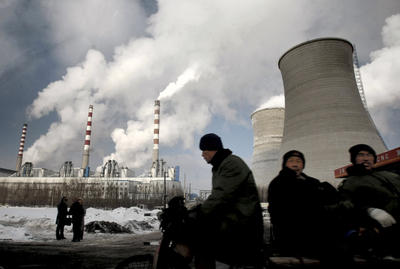Although the statement was vague about the timetable and the tax rate, the mere prospect of China pricing carbon should have prompted swift laudatory international responses, especially by countries that have long hectored China to take stronger action on climate.
China’s announcement, and the underwhelming response of the international community, shows that it’s time to start an international conversation about pricing carbon and that anyone who’s interested should be invited aboard. A Carbon Pricing Consultation (CPC) would allow China and other countries that want to price carbon (via a carbon tax, cap-and-trade system or a hybrid approach) to learn more about it, exchange views, find out what other countries are considering, and potentially coordinate their policies.
A CPC process would lead to detailed, pragmatic and ongoing international discussion of the implementation details of domestic carbon pricing approaches, policies that economists widely agree could address the climate problem cost effectively. A domestic carbon price creates broad, efficient incentives to reduce greenhouse gas emissions. Done well, it would gradually shift consumer demand, production methods, new investment and technology development toward less emissions-intensive goods and services without unduly burdening poor households. Pricing carbon can also raise revenue to fund government programs or cut distortionary taxes. Finally, a carbon price can promote economic growth by replacing less efficient regulatory and spending policies.
Accordingly, parties should embrace carbon pricing as a key low-carbon growth strategy and establish a venue to discuss it. Disparate carbon prices across different countries can shift emissions, production, investment and trade patterns, and mutual understanding of these cross-border effects is of interest to all. Several countries have adopted or are implementing carbon pricing policies, so there is increasing experience to discuss. And the vehement opposition to the European Union’s efforts to price carbon in aviation fuels suggests that unilateral approaches to carbon pricing can undermine progress.
This moment to begin a CPC process is opportune. Climate talks in December 2012 in Doha, Qatar, resolved contentious questions about the future of the Kyoto Protocol and finally retired the constraints of the Bali agenda. Now negotiators will turn to developing a new agreement under the United Nations Framework Convention on Climate Change to cover the post-2020 period. At the same time, the Major Economies Forum (MEF) needs a new thrust of engagement, having developed the Clean Energy Ministerial into an enduring venue for technology discussions. A CPC would fit nicely within the MEF, or possibly the G20.
This new line of discussion would address a glaring gap in climate talks to date. Negotiations have tackled emissions targets, temperature targets, technology transfer, financial assistance to poor countries, forest preservation and many other topics, but not the practical design of cost-effective domestic mitigation policy. Indeed, few countries include their finance and trade ministries in climate talks outside of discussions of finance. This vacuum of economic expertise and leadership leaves parties prone to commitments, such as a two-degree maximum global mean temperature increase, that imply implausibly stringent global efforts and fail to identify concrete solutions.
The CPC, unlike existing clean energy and climate consultations, would be led by finance and trade ministries (not the environment and energy ministries). It would focus exclusively on the practical administrative and technical aspects of responsible mitigation policy. One advantage of this pragmatic approach is that parties could sidestep divisive issues, such as who bears responsibility for collective mitigation goals, who should compensate whom for what, and whose approach is more ethical. However justifiable, these debates have done little to promote real emissions mitigation.
The CPC would focus on the technical and administrative aspects of the policies, such as options to identify taxable or regulated entities and sources and methods to track revenue, minimise administrative costs and ensure compliance. Parties could also discuss the role of international offsets and the interplay between carbon pricing and other domestic climate and energy policies. Countries could discuss ways to predict the effects of alternative tax trajectories, and they could discuss how to distribute and manage markets of allowances and tax revenue. Other topics could include the design of border carbon adjustments and other trade-related issues. The CPC could also steer existing resources to assist developing countries in reducing fossil fuel subsidies and pricing carbon.
One impediment to climate policy in the United States is the concern that without meaningful action by developing countries, pricing carbon will harm the US economy with little overall environmental benefit. A move toward transparent price-based policies gives all major emitters comfort that they are moving forward in concert with others. The first step is to discuss how to do it.
Adele C. Morris is a fellow and policy director at the Climate and Energy Economics Project, the Brookings Institution.
Warwick McKibbin is a professor at the Crawford School of Public Policy, the Australian National University, and nonresident senior fellow at the Brookings Institution.
Peter J. Wilcoxen is an associate professor at the Center for Environmental Policy and Administration, Syracuse University, and nonresident senior fellow at the Brookings Institution.
This article is based on the authors’ discussion paper, ‘A Climate Diplomacy Proposal: Carbon Pricing Consultations’.


While China’s announcement of a carbon tax should be welcomed and the authors’ suggestion of establishing a carbon price consultation mechanism is undoubtedly very useful, from an economics point of view, whether unilaterally imposing a carbon tax is the most optimal environmental policy for China or not is a question.
I would suspect that the marginal benefits of reducing its tangible air pollution and water pollution are likely to be higher than the marginal benefits of a general reduction in emissions, particularly when measured against the costs and measured in local rather than global terms and the fact that a reduction in air pollution also has an effect in reducing emissions.
But economics is economics and politics is politics. Should China adopt a carbon tax, it will be good for the world.